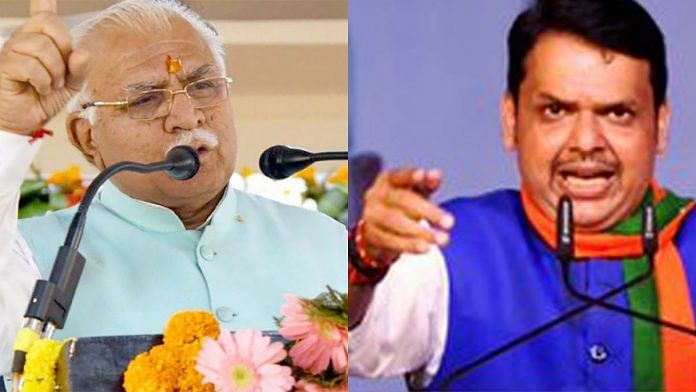Cracks in the edifice
Pratap Bhanu Mehta | Contributing Editor
The Indian Express
The “close result” in Haryana and the BJP’s “inability to put in a command performance” in Maharashtra has “opened up a crack through which some light can come in”, writes Mehta. He maintains that there is nothing “inevitable” about the “BJP juggernaut” and there is an “undercurrent of dissatisfaction” which is being “sidelined by high-decibel nationalism issues”.
Haryana demonstrates that “messaging requires responsiveness to context, not just the wielding of a mantra” which is what nationalism may have become, he adds. Mehta, further, argues that the “salience of social identity” can be an effect and not just a cause of politics.
He draws two “interesting lessons” from the verdict – one, candidates in the “swirl of corruption allegations” have performed well and the “anti-dynastic card” seems to be more a “generic national trope” than an effective strategy. Secondly, voters can “spot the difference” between the “intent to clean up the system” and a “vendetta to target political opponents”.
Mehta writes that the biggest significance of this election is, “it breaks that self-fulfilling cycle of single-party dominance”. This election gives an “important reprieve” against BJP’s “arrogance” and “some heart” to the opposition. He calls on the opposition to “convert a protest vote” into an “alternative economic and ideological narrative”.
The poll wind direction may have changed
Sanjay Kumar | Director, Centre for the Study of Developing Societies (CSDS)
The Hindu
“Past electoral verdicts” suggest that voters “generally vote” for the same political party in the assembly and the Lok Sabha elections if they are held “within a short span of time”. The verdict of Haryana and Maharashtra assembly elections showcases otherwise, writes Kumar. He notes that voters had concerns about “growing unemployment, rural distress and the farmer crisis” and issues of “national identity” could not completely “overshadow the local issues.”
The Shiv Sena-BJP alliance retained power in Maharashtra but there was a drop in their vote share since 2014. In Haryana, BJP suffered a “massive setback” as well if “one looks at its performance” in the 2014 Assembly elections and the 2019 general elections.
BJP’s strategy of “building a coalition” of various castes “leaving aside the dominant caste” of Haryana “did not last long” and the party “paid the price”. Kumar observes that the “success” of the Congress is due to the “ire of the numerically larger Jats” in the state. He calls on the BJP to “share the credit” of its victory equally with Congress.
There is no doubt that the vote was against the ruling establishment
Rahul Verma | Fellow at the Centre for Policy Research (CPR)
Hindustan Times
Verma argues that there is “no doubt that the vote on 21 October was against the ruling establishment” and notes that the BJP’s performance points to “the party’s fragile bases” in the assembly elections.
Congress’ “treatment” of its state leaders can be seen as a “key factor” in the electoral outcomes. Bhupinder Singh Hooda had the “capacity to mobilise the party troops” while Sharad Pawar “fought like a lone warrior to save his family bastion”.
Analysts suggest that BJP lost “more votes in rural areas” in both states and “failed to keep the dominant caste in its coalition”. Verma writes that when Modi is not a “contender” himself, “local concerns” are the “dominant factor” for voters. In conclusion, he raises a question – has India “moved closer to a one-party dominant system” or is there still “space” for the opposition.
The effort to reduce poverty in India is riddled with complexity
Himanshu | Associate professor, JNU
Mint
Himanshu criticises randomised control trials (RCTs), an experimental approach to alleviating poverty that won Abhijit Banerjee, Esther Duflo and Michael Kremer this year’s Nobel Prize in Economics.
RCTs only examine micro aspects of behaviour and are “unlikely to provide solutions to some of the vexed issues of poverty” that depend on a range of social, political and economic factors, explains Himanshu. They inexplicitly hold individuals or households responsible for their own poverty, and thereby show “an inaccurate understanding of why poverty persists”, he writes. Given that they cannot produce similar results when replicated and include parameters that are not always quantifiable, RCTs also have limited methodological superiority.
India’s history shows that “large-scale secondary data”, “micro studies” and “evidence based on the experience of state governments and grassroot activists” have done better in improving policy — “take a look at the large-scale surveys that led to the passage of the National Food Security Act (2013)”, writes Himanshu.
Expectations, not policy, key to recovery
Madan Sabnavis | Chief economist, CARE Ratings
Financial Express
In his piece, Sabnavis debates whether monetary policy and targeting inflation can do enough in stimulating economic growth. He predicts that the way forward amidst the slowdown will be “driven by statistical biases [rather] than real policy impulses”.
According to Milton Friedman’s monetarism, credit measures do little to revive an economy in a market-driven system. In India, lowered repo rates have been “timid” and can risk making monetary policy “impotent” if they go down further, explains Sabnavis.
The US has tried to contain inflation at less than 2 per cent but low incomes and unemployment inhibit people’s purchasing power. Sabnavis also points out that the Euro region suffers from a similar problem for over a decade now.
Ever since “the financial crisis and Euro region imbroglio” led to increased protectionism and sidetracked trade treaties, there is more emphasis on growth to be internal, he adds and recommends following “the path of Rational Expectations, where the market should be left alone.”



